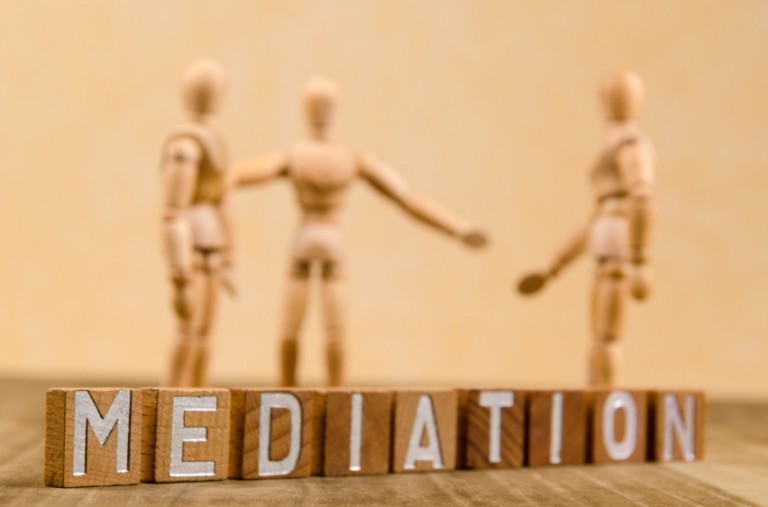If an employee asserts legal claims against his current or former employer, mediation may offer a lower-stress alternative to lawsuits for the resolution of those claims.
What is Mediation and How Does it Work in Employment Cases?
Black’s Law Dictionary defines mediation as: “A method of nonbinding dispute resolution involving a neutral third party who tries to help the disputing parties reach a mutually agreeable solution.” In the context of an employment case, the “disputing parties” are typically the employer and a former employee. Mediation can take place at any time while a case is active and can occur more than once. Unless ordered by a court or administrative agency, mediation is voluntary.
“A method of nonbinding dispute resolution involving a neutral third party who tries to help the disputing parties reach a mutually agreeable solution.” In the context of an employment case, the “disputing parties” are typically the employer and a former employee. Mediation can take place at any time while a case is active and can occur more than once. Unless ordered by a court or administrative agency, mediation is voluntary.
Selecting a Mediator
In employment cases, parties often prefer to select mediators who have experience in employment law either as an attorney or judge. Employment cases can be complex and emotional; experienced mediators understand this and are often best able to assist parties to find comprehensive resolutions of employment disputes.
If a party is working with an attorney at the time the parties decide to mediate their dispute, the attorney can assist with identifying potential mediator candidates.
Parties will be required to pay the mediator for the time she spends preparing for and conducting the mediation. An experienced attorney will be able to determine whether the proposed fees are fair and reasonable.
Preparing for Mediation
Parties should have a solid grasp of the facts, law, and damages relevant to their case. Though mediators typically require and review a pre-mediation statement from each party, there will be factual questions and legal principles that arise during the mediation session. Parties should be prepared to address those issues as they arise.
Parties should also have a comprehensive analysis of the damages available to the plaintiff or complainant and any applicable set-offs to damages. It is often helpful to begin mediation with a calculation of damages, including all possible elements of a final damages calculation.
Depending on when the mediation takes place – whether at the beginning of the dispute or closer to trial – the parties should familiarize themselves with the pleadings and discovery available to them at that point.
The Mediation Session
Mediators have significant latitude in conducting a mediation session, so mediations can and do occur in a variety of formats. However, many mediators first meet with both parties and their attorneys together, in one room, to explain the “rules” of the mediation. Then, each side typically gathers in separate rooms to discuss opening settlement proposals. Later, the parties remain in these separate rooms and discuss offers from the other party and a strategy for responding to those offers.
A skilled mediator can and will assist the parties with identifying strengths and weaknesses in their respective positions. As a neutral third party, a mediator can often speak from an objective point of view enhanced by years of employment law experience. Ultimately, the parties will reach an “impasse” where no settlement takes place or, ideally, they will reach an agreement on the terms of a dispute settlement. In the latter case, the mediation has been successful and, subject to the drafting and signing of a formal settlement agreement document, the dispute has been resolved.
Mediation Programs in Government Equal Opportunity Departments
The Madison Equal Opportunities Division maintains an early mediation program for parties to a discrimination complaint. The State of Wisconsin Equal Rights Division also offers mediation at early and later stages in litigation of complaints before that agency. The U.S. Equal Employment Opportunity Commission administers a less-structured mediation program for parties to charges of discrimination pending before it.
Can Mediation Help in Your Employment Dispute?
If you have filed a complaint and have been invited to mediation of the dispute, the employment attorneys of Hawks Quindel, S.C. may be able to help. Please contact us via email or phone to discuss your case.
- Whistleblowers Who Report Paycheck Protection Fraud Can Win Money - May 5, 2020
- Healthcare Workers May Not Be Fired for Reporting COVID Violations - April 6, 2020
- Late Fees Over $10 Are Illegal for Car & Payday Loans in WI - January 11, 2019
